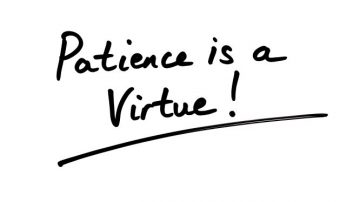Patience is a Virtue
Tuesday, April, 21st, 2020 Dean's Monthly Reflections

I am in a rush. I enter the bank. There are two lines of people. I choose what I think is the shorter of the two. I look over to the other line and see a man with a red scarf who is at about the same distance from the counter as I am. I look at my watch, as if the gesture will make the people in front of me move faster. Inevitably my line moves slower. The man with the red scarf has already taken care of his banking business and left. The slower my line moves the more agitated I get, the more I look at my watch, willing the line to move faster. Finally, I breathe a sigh of relief as the person in front of me steps to the counter. Unfortunately, that person takes their time and I am “cursed” to wait. I have no patience.
I can’t remember when I first heard the phrase “patience is a virtue.” It must have come to my mind several times this week. Dean Robert Kasberg mentioned how patient our students have been during this public health crisis. I mentioned it to my leadership team in one of our daily meetings as they pressed to move clinical guidelines and protocols along.
When I looked up the definition of patience, I was surprised to see the use expressed in the context of a dental issue (sorry Dr. Trotman) and also the mention of toothpicks (and sorry to those stuck at home with toddlers/children/young adults!):
“Patience is a person’s ability to wait something out or endure something tedious, without getting riled up. It takes a lot of patience to wait for your braces to come off, to deal with a toddler’s temper tantrum, or to build a house out of toothpicks.”
From Vocabulary.com https://www.vocabulary.com/dictionary/patience
Virtue is also defined as the quality of being morally good.
Right now our patience is being tested.
We are all looking at our watches—willing the line to move faster.
D20s and senior residents have a deadline to complete requirements in order to graduate. They look at the people ahead of them willing the line to move. D21s want to be in clinics, they watch the line next to them move more quickly. Staff members ask how they can volunteer to move the line along and direct traffic—they know how things work. Administrators and faculty have clinical protocols and clinical equivalency matrices in place, and they will “the person at the counter” to stop asking mundane questions.
We ask for your patience, I ask for your patience.
COVID-19 is an unknown entity. It infiltrates the line, it makes the line stop, it makes the line hesitate, it forces people in the line to maintain a 6-foot distance, it forces the man to wrap the red scarf over his mouth and nose. It does not care which line moves more quickly. In fact, it harms those that move more quickly. COVID-19 makes people sick, it spreads, it is the unknown. It has changed the way we live, the way we function and it will continue to rule our lives until we have a successful treatment, or we are immune to its insidious effects. Unfortunately, “It” is the person at the counter asking the endless questions. Holding up the line, holding up our lives.
Each person has been patient. We have to continue to be patient.
I thank you all for waiting and for your outstanding virtue of patience.
Dean Karimbux